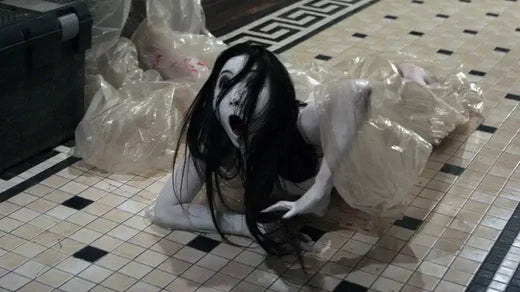
The Thrilling World of Horror Movies in Japanese Cinema
Japanese horror movies, or J-horror, hold a special place in the global cinematic landscape. Known for their unique storytelling, atmospheric tension, and deeply psychological scares, these films have captivated audiences worldwide.
Whether you're a seasoned horror fan or new to the genre, Japanese horror movies offer a different type of experience of fear and suspense .
In this blog post, we'll explore some iconic horror movies in Japanese cinema, their cultural significance, and why they are a must-watch for any horror aficionado.
The Essence of Japanese Horror
Japanese horror movies are distinct from their Western counterparts. While Western horror often relies heavily on gore and jump scares, J-horror tends to focus on building a pervasive sense of dread and unease. The themes often revolve around psychological horror, supernatural elements, and folklore. This unique blend creates an immersive and unsettling experience that lingers long after the credits roll.
Iconic Japanese Horror Movies
1. Ringu (1998)

"Ringu," directed by Hideo Nakata, is perhaps the most internationally recognized Japanese horror film. The story centers around a cursed videotape that leads to the viewer's death seven days after watching it. The film's eerie atmosphere, combined with the haunting image of Sadako, has made "Ringu" a cornerstone of J-horror. It spawned numerous sequels, remakes, and a franchise that continues to influence the horror genre globally.
2. Ju-On: The Grudge (2002)

Takashi Shimizu's "Ju-On: The Grudge" is another seminal work in Japanese horror. The film explores a curse born from a violent death, which attaches itself to anyone who comes into contact with it. The non-linear narrative, chilling sound design, and the iconic ghostly figures of Kayako and Toshio make this film a terrifying experience. "Ju-On" was also adapted into a successful American remake, further solidifying its impact.
3. Pulse (Kairo) (2001)

Kiyoshi Kurosawa's "Pulse" (Kairo) is a haunting exploration of isolation and the fear of technology. The film delves into the eerie consequences of the dead infiltrating the world of the living through the internet. Its slow-burn tension, bleak atmosphere, and philosophical undertones make it a standout in the genre. "Pulse" has been praised for its innovative approach and remains a chilling reflection on the digital age.
4. Dark Water (2002)

"Dark Water," directed by Hideo Nakata, is based on a short story by Koji Suzuki, the author of "Ringu." The film follows a mother and daughter who move into a rundown apartment with a mysterious water leak. The film masterfully combines supernatural elements with themes of parental anxiety and urban decay. Its atmospheric horror and emotional depth make "Dark Water" a compelling watch.
5. Audition (1999)

Takashi Miike's "Audition" is a psychological horror that starts as a slow-burn drama before descending into shocking and brutal horror. The story follows a widower who holds a fake audition to find a new wife, only to discover that the woman he chooses has a dark and violent past. "Audition" is known for its disturbing imagery and unsettling climax, making it a cult favorite among horror fans.
Cultural Significance of J-Horror
Japanese horror movies are deeply rooted in the country's culture and folklore. Many films draw inspiration from traditional ghost stories (kaidan) and urban legends (toshi densetsu). These stories often reflect societal fears and anxieties, such as the fear of isolation, the impact of technology, and the consequences of past actions.
The influence of Buddhism and Shintoism is also evident in J-horror, with themes of the afterlife, spirits, and purification frequently appearing. This cultural richness adds depth to the horror, making it not just about scares but also about exploring profound existential themes.
Why You Should Watch Japanese Horror Movies
-
Unique Storytelling: Japanese horror movies often defy conventional narrative structures, offering fresh and unpredictable stories that keep viewers on the edge of their seats.
-
Psychological Depth: The focus on psychological horror and deep, lingering dread creates a more immersive and thought-provoking experience.
-
Cultural Insights: Watching J-horror provides a glimpse into Japanese culture, traditions, and societal concerns, enriching your understanding of the genre and the country.
-
Innovative Filmmaking: Japanese directors are known for their innovative techniques and artistic vision, pushing the boundaries of the horror genre.
Conclusion
Japanese horror movies are a testament to the power of cinema to evoke fear and provoke thought. Their unique blend of psychological horror, cultural depth, and innovative storytelling makes them a fascinating genre to explore. Whether you're drawn to the haunting images of "Ringu," the relentless terror of "Ju-On," or the philosophical musings of "Pulse," there's a Japanese horror movie that will leave a lasting impression. Dive into the world of J-horror with films on blu ray and DVD from the Terracotta store, and experience a different kind of fear that stays with you long after the screen goes dark.
For those new to the genre, the films mentioned above are excellent starting points. They not only showcase the best of Japanese horror but also highlight the rich cultural tapestry from which these chilling tales are woven. So, grab some popcorn, turn off the lights, and get ready for a journey into the dark and intriguing world of horror movies in Japanese cinema.